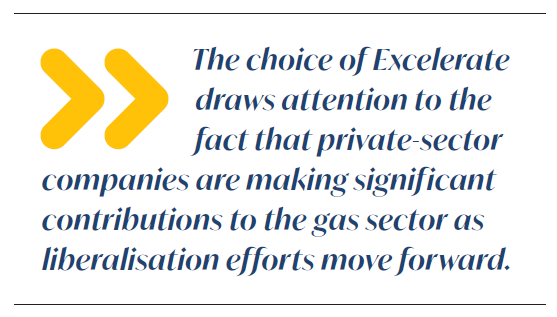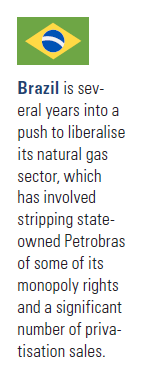Brazil’s gas sector struggles to evolve [Gas in Transition]
On December 17, Transportadora Associada de Gas (TAG), the operator of a 2,800-km natural gas pipeline network serving customers in northern and eastern Brazil, wrapped up tenders for the right to provide balancing and congestion management services in 2022. It named its former owner, the national oil company (NOC) Petrobras, as the winner of the congestion management contract and Excelerate Energy, a US-based private company, as the winner of the balancing contract. Both companies were due to sign contracts with TAG by the end of December.
Under the terms of the balancing services tender, Excelerate will be responsible for loading gas into TAG’s system and withdrawing it as necessary in order to maintain the appropriate pressure levels and to remain in alignment with earlier nominations. These volumes will effectively serve as TAG’s injection service. This is a cost pass-through service that users of the pipeline system must draw on when they create imbalances in the network that they cannot resolve immediately by loading additional volumes of gas into the pipes.
Petrobras, meanwhile, will be expected to manage congestion by providing TAG with extra gas for on-the-spot delivery to thermal power plants (TPPs) and other customers that can shift consumption levels when necessary for operational reasons. (TAG will also procure volumes of gas to cover spot demand.) The cost of this service will be covered through a surcharge imposed on all users of the TAG pipeline system.
The two companies will provide these services during the current year only, and TAG has said that it does not intend to hold another round of tenders next December. Instead, it has indicated that it hopes Brazil’s domestic gas market will be sufficiently liquid by the end of 2022 that balancing and congestion management services can be obtained in even more competitive ways.
The outcome of these two tenders is not exactly central to the fate of Brazil’s gas industry, and as noted above, its impact will not be long-term. However, it does illustrate a few key points about the current state of the sector, as the government moves ahead with liberalisation and as the country struggles with supply problems.
Increased importance of LNG
First, the selection of Excelerate as the winner of the balancing services tender highlights the fact that LNG has become an increasingly important source of gas supplies in Brazil.
In all likelihood, Excelerate was chosen specifically because it submitted the most favourable bid in the tender. However, it probably chose to participate in that specific tender because of its capabilities in the area of LNG and because of its existing footprint in the Brazilian market. After all, the US-based firm specialises in providing LNG solutions, including both delivery facilities and distribution networks, and is already providing some of those solutions in Brazil.
Excelerate is particularly well-positioned to supply those solutions to TAG. Since 2012, it has delivered LNG to Brazil via floating storage and regasification units (FSRUs) to three Brazilian terminals operated by Petrobras – Bahia, Guanabara Bay and Pecem, all of which are linked to the TAG network along Brazil’s Atlantic coast.
Brazil has become increasingly dependent on companies like Excelerate. With a prolonged drought drying up the rivers that usually keep its hydroelectric power plants (HPPs) running, it needs another source of fuel for electricity generation. It has turned to gas – and specifically to imported LNG, since it cannot extract enough from domestic fields to cover demand on this front.
And demand has certainly shot upwards since late spring of last year, when Brasilia approved a new set of measures to compensate for falling HPP output. Data published by Brazil’s Ministry of Mines and Energy show that June 2021 alone, Brazil imported the equivalent of 35.1mn m3/day of LNG, more than four times the 2020 full-year average of 8.2mn m3/d and the 2019 average of 8.3mn m3/d. This is equivalent to nearly 40% of Brazilian gas demand, which averaged 88.7mn m3/d in the first half of 2021.
It is also just about enough to cover the extent to which gas demand rose in the industrial and power-generating sectors in the January-June period. According to ministry data, the power-generating sector reported demand of 44mn m3/d, up 69% or 26mn m3/d from the year-ago figure of 18mn m3/d, while industrial demand came to 42mn m3/d, up by 16% or 10mn m3/d on the year-ago figure of 32mn m3/d.
Higher profile for private-sector companies
Second, the choice of Excelerate draws attention to the fact that private sector companies are making significant contributions to the gas sector as liberalisation efforts move forward.
After all, Excelerate is now a direct beneficiary of Petrobras’ divestment and privatisation drive. Last September, it signed a 12-month leasing contract for the Bahia facility. Then in December, it began regular shipments to the terminal, where it has anchored the Excelerate Sequoia FSRU, a vessel with a storage capacity of 173,400 m3.
The US-based company did so as a result of Petrobras’ third attempt to lease the Bahia LNG terminal. The facility is capable of importing as much as 19.8mn m3/d of gas but has been operating below capacity for some time. Petrobras has indicated that it hopes Excelerate will be able to increase delivery volumes – and it may very well be called upon to do so, given the role it is supposed to play under the balancing services contract. (At the very least, the Excelerate Sequoia FSRU’s storage capacity will be useful for injection services when they are needed on short notice.)
The decision to award this contract to a privately-owned firm such as Excelerate is in line with the government’s long-standing arguments in favour of competition in the gas sector. Henrique Anjos, lead gas and research analyst with Wood Mackenzie, notes that liberalisation aimed to give the industry more flexibility.
“Until the end of 2019, Petrobras was the only company able to import natural gas, as it owned the only LNG import terminals,” he tells NGW. “Through the cease-and-desist agreement, CADE [the federal antitrust agency] began limiting the procurement of imported gas by Petrobras. The policy is intended to support any kind of natural gas operations. Imported gas provides flexibility and higher competition.”
Petrobras still a key player
Finally, despite the significance of the contract award to Excelerate, it is also worth noting that Petrobras is still set to play an important role in maintaining the equilibrium of TAG’s extensive pipeline network. Moreover, this role is important enough that TAG is imposing a surcharge on all users of its system to ensure that the costs of congestion management services are covered.
This is worth considering in light of the fact that Brazil has yet to bridge the gap between allowing competition in the gas sector and actually seeing competition in the gas sector. The government may have formally incorporated gas market liberalisation measures into the national legal regime last April, but as of the end of 2021, Petrobras still accounted for about 90% of the country’s total gas production.
True, steps are being taken to slip the sector out of the NOC’s hold – as evidenced by the fact that TAG announced the result of the balancing and congestion management services tenders just one day after revealing that it intended to auction off extra capacity in its system in late December 2022. Not so long ago, no such announcement would have been possible, as Petrobras would have been the only party with access to the pipelines (and probably to the gas as well).
Indeed, Lisa Viscidi, the director of the Energy, Climate Change and Extractive Industries Programme at Inter-American Dialogue (IAD), points out to NGW that TAG itself had only recently shed its last links to Petrobras. The NOC did not sell its last 10% stake in the pipeline operator until 2020, she noted.
Even so, it will take time to effect those changes. And this means that liberalisation is likely to move forward to some degree while the balancing and congestion management contracts are in effect this year, but that there will still be ground to cover by the start of 2023.



